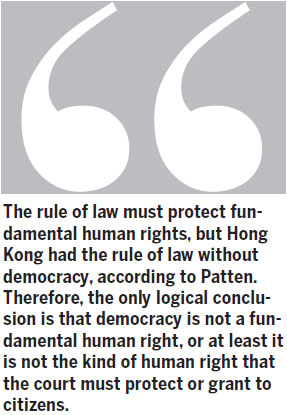Making references to Nazi Germany in HK is wrong
Updated: 2014-11-18 09:13
By Lau Nai-keung(HK Edition)
|
|||||||
Hong Kong's last colonial governor Chris Patten once argued that "the rule of law is a phrase often used but seldom defined. It can easily become a portmanteau expression of political virtue". That was an understatement. More simply, the term is pure gobbledygook. And unfortunately, the "Occupy Central" movement has made this nonsense the focal point of its discussions and forced us into a rather meaningless debate.
On the matter of the rule of law, Democratic Party lawmaker Albert Ho, also a qualified lawyer, was reported as saying that obeying the law is a matter of personal choice based on conscience, because "Germany also had a large set of unjust laws under the Nazis".
While Ho's opinion was mystifying enough, Mary Ma's critique of what he said was no more enlightening. Writing in The Standard, Ma asked "does Ho know his critics could easily strike back, reminding him that Adolf Hitler was named chancellor by a democratically elected president?" This argument is convincing only if we all believe that Nazi Germany was genuinely democratic, and there is somehow a causal relationship between justice and democracy.
Where did Ho and others in Hong Kong pick up the reference to Nazi Germany? I believe I know the answer. In 2010, Chris Patten wrote a review on The Rule of Law. The book was considered important because it was written by Tom Bingham, or Lord Bingham, who has successively held prominent positions in the British judiciary as master of the rolls, lord chief justice of England and Wales, and senior law lord of the United Kingdom.

In the book, Lord Bingham outlines a formal definition of the rule of law, based on the core principle that "all persons and authorities within the state, whether public or private, should be bound by and entitled to the benefit of laws publicly made, taking effect (generally) in the future and publicly administered in the courts". He then included several additional normative principles: clarity, limitation of discretion, equal application of the law to all, capability to appropriately resolve civil disputes, appropriate exercise of public powers, and fair adjudicative procedures.
We can pause here and reflect upon the fact that Lord Bingham has made it clear that the law binds all people as well as authorities, a contradiction to the belief commonly held by dissidents here that the rule of law concerns only the conduct of the authorities.
Naturally, Lord Bingham acknowledges the measures above alone are not sufficiently comprehensive, and thus incorporates two additional elements, namely: adequate protection of human rights, and compliance by the state with its obligations under international law.
Citing the example of Nazi Germany, Lord Bingham maintains that a state "which savagely represses or persecutes sections of its people cannot...be regarded as observing the rule of law, even if the transport of the persecuted minority to the concentration camp...is the subject of detailed laws duly enacted and scrupulously observed." These lines have inspired people like our honorable Albert Ho to absurdly liken our government to that of Nazi Germany and our court's injunction orders to laws enacted to transport the Jews to concentration camps.
Dissidents here in Hong Kong noticed Lord Bingham's book not only because their beloved Chris Patten wrote a review, but also because in the review Patten referred to Hong Kong, saying that "I can only think of one society, Hong Kong, that has the rule of law but is not democratic." If our dissidents have any capacity for critical thinking and reflection, they would realize that Patten's statement amounts to saying that democracy is not a necessary condition for the rule of law, and they should not be happy about the implications.
The rule of law must protect fundamental human rights, but Hong Kong had the rule of law without democracy, according to Patten. Therefore, the only logical conclusion is that democracy is not a fundamental human right, or at least it is not the kind of human right that the court must protect or grant to citizens. All the judgments our courts have delivered also confirm this principle: They have never hesitated to criticize the executive branch of the government and uphold human rights, but they are not that keen on democracy per se.
A careful reading of Lord Bingham's text would suggest that the claim that the "Occupy" movement upholds, rather than damages the rule of law, is unfounded. Moreover, democracy is no defense for the occupiers' unlawful acts.
In a road traffic case, Lord Bingham somehow managed to quote Hamlet: "The (European Convention on Human Rights) is concerned with rights and freedoms which are of real importance in a modern democracy governed by the rule of law. It does not, as is sometimes mistakenly thought, offer relief from 'The heartache and the thousand natural shocks/That flesh is heir to.' "
One may argue that Bingham's commentary is irrelevant, because Hong Kong is not a "modern democracy", but the concept of human rights and the rule of law should not be invoked too easily, either.
The author is a current affairs commentator.

(HK Edition 11/18/2014 page1)